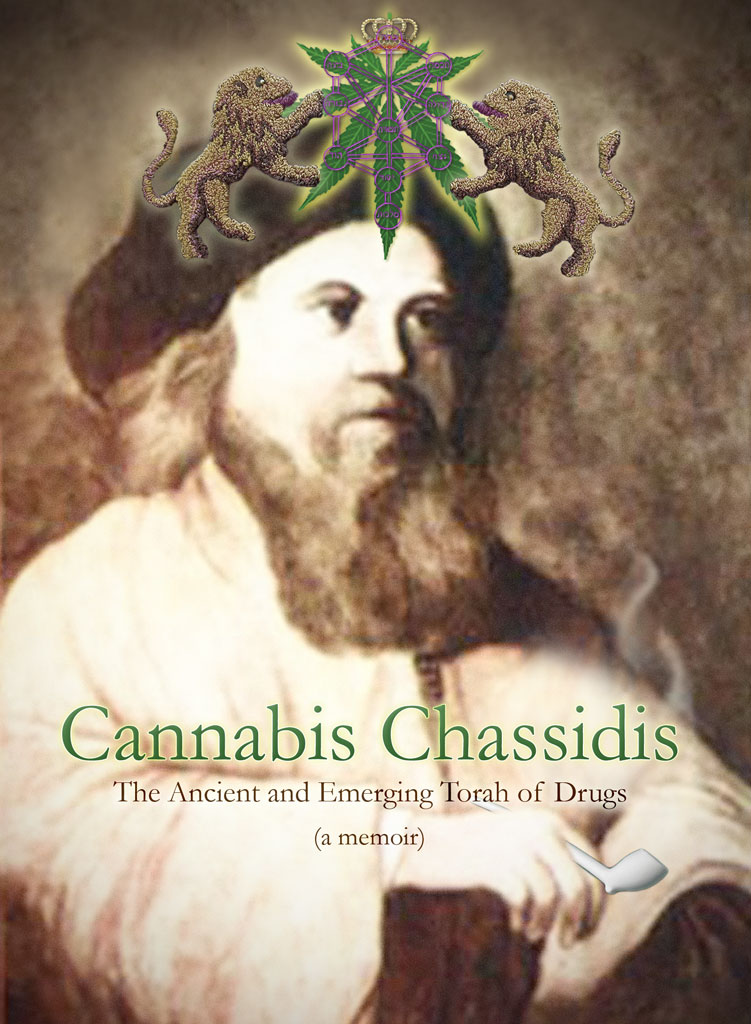
A flashing sense of humor, ocean-deep knowledge of Hasidic thought, and a far-ranging, anarchic mind describe the writing style of Yoseph Leib, author of “Cannabis Chassidis: The Ancient and Emerging Torah of Drugs (A Memoir).”
Raised Hasidic in Brooklyn, New York, and most at home at Rainbow Gatherings and jam band concerts, Leib restlessly sampled Hasidic yeshivas (religious schools) in the U.S. and in Israel in search of teachers and teachings open to his kind of ecstatic spiritual experience; one that venerates trance-dance, LSD, mushrooms and cannabis. Reader, prepare for a chaotic, frenetic travelogue of the heart!
The Hasidic revolution of 18th and 19th century in Eastern Europe was a passionate Jewish revival movement fueled by attachment to charismatic teachers who led the faithful into transcendent experiences of personal divine connection. Their greatest, founding teacher was the Ukrainian rabbi known as the Baal Shem Tov, “Master of the Good Name.” You’ll see a picture of him on the cover of the book. Many other mystics followed his path, spreading Hasidic thought and culture. The Nazi holocaust of the 1930s and 40s devastated these communities, as they did the rest of Judaism; survivors regrouped in the U.S. and Israel where they settled in tight-knit communities, according to MyJewishLearning.com.
Out of one of these enclosed communities came our hero, a child of relative safety and privilege in the U.S., and so allowed a more exuberant expression of life than Jews had known for centuries. And the Hasidim can truly express themselves jubilantly. Hasidic traditions have differences, but the emphasis is on the passionate love of God through trance-prayer, dance-prayer, drumming, drinking and singing. Leib, our intrepid guide, leads us from teacher-to-teacher in search of the most righteous spiritual trip. And for Leib, that means the inclusion of cannabis and entheogens such as mushrooms and LSD. Not finding any such open teaching in America, he traveled to Israel fresh out of high school on the same quest.
His book is a memoir of that spiritual journey, introducing the reader to people arguing esoteric points of Hasidic or Rabbinic law and history, even Israeli Hasids living the Nyabinghi Rastafarian way. Leib, of course, starts with the quote from Genesis often lovingly invoked by Rastafari, “I give you all seed-bearing herbs…” to remind us that holiness resides in plant life and abounds for our sustenance. Genesis is, of course, book one of the Torah as accepted world-wide in Judaism. But Leib broadens the word Torah to include any teaching, “transcending old patterns… old, dangerous, limited thinking.” Leib asks,” What could inspire the better Torah to come into the world?” And he answers, “Only drugs. Trip, at once, with serious focus and intention…” He quickly qualifies that by adding, “You can do this without a single drug other than a walk outside…”
Leib yearns for a teaching that recognizes that cannabis is “liberating” and suggests we “need guidance on how to make drug use holy.” He sees cannabis and the entheogens as powerful tools to heal broken cultures, especially the deeply traumatized Jewish cultures of the world. But, as in the U.S., he does not find that transformative Torah in Israel either, the place his friend calls “The Land of Broken Dreams.” Leib attends many yeshivas and chronicles his sojourn as he either leaves or is thrown out of several of them. “My acid test for divinity school when I first came to Israel, was how do they relate to marijuana.” Seems our guide was too radical for any of them. Small wonder, given that he trained his heart, soul, and body at Heartwood Institute of Integrative Medicine in Garberville, California and at many a Phish and String Cheese Incident show.
Along with the travelogue, Leib’s book offers his insights into righteous, respectful drug use. He describes cannabis as an emotional “sweet” that can insulate us from experiencing the world full on; too much sweetness un-balances the system. He admits to excessive use in the past, but now prefers more limited use, usually at night and meant to enhance his understanding of the world as holy. “Ganja… is not a panacea, and demands to be used only at its right time,” he said. He praises the value of reciting the premier Jewish prayer, the Shema, “Hear, O Israel: The Lord our God, the Lord is one!” while tripping to enhance the sense of oneness with all creation.
If you are looking for full immersion in passionate Jewish thought, this book is for you. It’s a romp through ideas and places, a passionate plea for acceptance of the righteous use of entheogens, including cannabis. As the Kabbalah says, “Everything sings, celebrates, serves, develops, evolves, uplifts, aspires to be arranged in oneness.” And like the Kabbalah, Leib’s book is a gift of the heart to humanity.


This is a great review, and I’m so relieved at how much it feels like what I was doing came through. I worry about that kind of thing sometimes, and i’m really glad you were able to hear so much. You’re awesome!